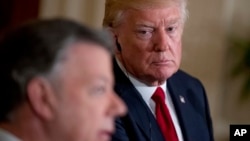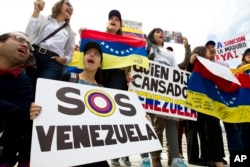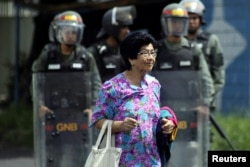The Trump administration on Thursday imposed new sanctions on eight members of the Venezuelan Supreme Court for trying to strip the opposition-led congress of all power earlier this year.
Among those targeted is Maikel Moreno, the president of the pro-government Supreme Court, which announced in late March that it would assume legislative responsibilities. The ruling was partially reversed amid domestic and international criticism, but it sparked a protest movement against socialist President Nicolás Maduro’s administration that has continued for nearly two months and left more than 40 people dead.
The eight “are responsible for a number of judicial rulings in the past year that have usurped the authority of Venezuela’s democratically elected legislature …. thereby restricting the rights and thwarting the rule of the Venezuelan people,” the U.S. Treasury said in a news release about the order.
The order freezes the jurists’ assets in U.S. jurisdiction and prohibits transactions with U.S. people. In February, the U.S. government imposed sanctions on Venezuela’s vice president, Tareck El Aissami, for his alleged involvement in global drug trafficking.
Add more targets?
Venezuela’s foreign minister, Delcy Rodriguez, took to Twitter to denounce the sanctions and accuse the United States of fostering "the destabilization of Venezuela." In a post Thursday evening, she called the move "outrageous and unacceptable," saying it breached "international and Venezuelan law."
Roger Noriega, a former U.S. ambassador to the Organization of American States, disagreed. He called the sanctions "important" but urged adding other targets.
"The sanctions are important, but in my opinion it is very important to focus more attention on the kingpins,” Noriega said in an interview Friday with VOA.
He suggested targeting Maduro, military general Néstor Reverol and pro-Maduro congressman Diosdado Cabello, saying they "have many resources for drug trafficking, corruption and properties here in the United States and use our financial system to continue their illicit activities."
Noriega concluded that it was "much more important to send a political signal at that level."
'There's great violence'
On Thursday, U.S. President Donald Trump called Venezuela's political crisis a "disgrace to humanity."
"We haven't really seen a problem like that ... in decades, in terms of the kind of violence that we're witnessing," Trump said at a joint news conference with visiting Colombian President Juan Manuel Santos.
“People don't have enough to eat. People have no food. There's great violence. ... We will work together to do whatever is necessary, to help with fixing that," Trump said, adding that "what is happening is really a disgrace to humanity."
Pressure increases on Maduro
The new sanctions comes as Maduro is facing increasing international pressure to hold elections. On Wednesday, the U.N. Security Council discussed the crisis for the first time at the request of the United States. The Washington-based Organization of American States is holding a rare foreign ministers council session on the troubled South American nation later this month.
Maduro's political foes have taken to the streets to demand that he schedule long-delayed elections, release political prisoners and permit the delivery of humanitarian aid. Demonstrations for and against the Maduro government have escalated since the socialist leader's call earlier this month for a new constitution.
VOA Spanish Service’s Cristina Caicedo Smit contributed to this report.







